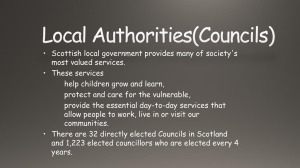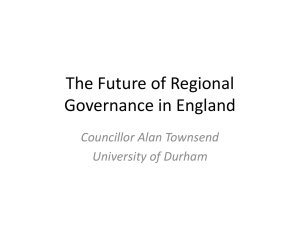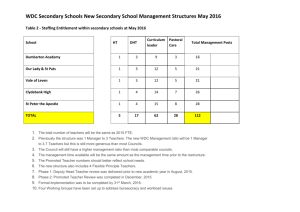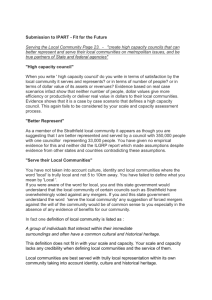Your Government How it works for you
advertisement
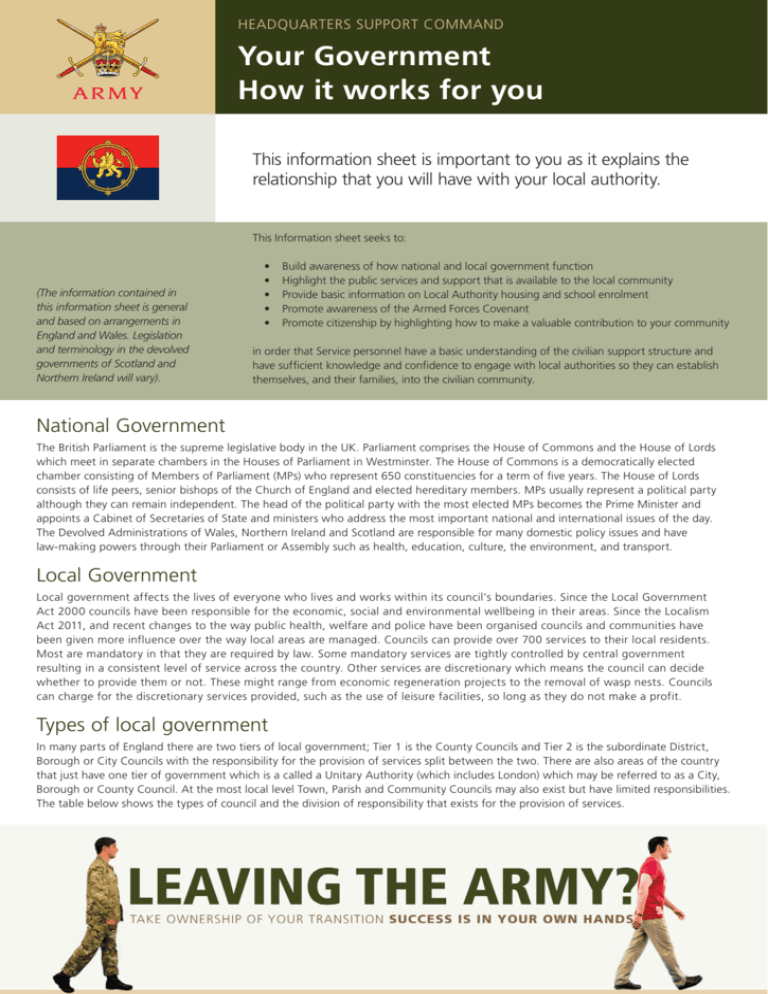
HEADQUARTERS SUPPORT COMMAND Your Government How it works for you This information sheet is important to you as it explains the relationship that you will have with your local authority. This Information sheet seeks to: (The information contained in this information sheet is general and based on arrangements in England and Wales. Legislation and terminology in the devolved governments of Scotland and Northern Ireland will vary). • • • • • Build awareness of how national and local government function Highlight the public services and support that is available to the local community Provide basic information on Local Authority housing and school enrolment Promote awareness of the Armed Forces Covenant Promote citizenship by highlighting how to make a valuable contribution to your community in order that Service personnel have a basic understanding of the civilian support structure and have sufficient knowledge and confidence to engage with local authorities so they can establish themselves, and their families, into the civilian community. National Government The British Parliament is the supreme legislative body in the UK. Parliament comprises the House of Commons and the House of Lords which meet in separate chambers in the Houses of Parliament in Westminster. The House of Commons is a democratically elected chamber consisting of Members of Parliament (MPs) who represent 650 constituencies for a term of five years. The House of Lords consists of life peers, senior bishops of the Church of England and elected hereditary members. MPs usually represent a political party although they can remain independent. The head of the political party with the most elected MPs becomes the Prime Minister and appoints a Cabinet of Secretaries of State and ministers who address the most important national and international issues of the day. The Devolved Administrations of Wales, Northern Ireland and Scotland are responsible for many domestic policy issues and have law-making powers through their Parliament or Assembly such as health, education, culture, the environment, and transport. Local Government Local government affects the lives of everyone who lives and works within its council’s boundaries. Since the Local Government Act 2000 councils have been responsible for the economic, social and environmental wellbeing in their areas. Since the Localism Act 2011, and recent changes to the way public health, welfare and police have been organised councils and communities have been given more influence over the way local areas are managed. Councils can provide over 700 services to their local residents. Most are mandatory in that they are required by law. Some mandatory services are tightly controlled by central government resulting in a consistent level of service across the country. Other services are discretionary which means the council can decide whether to provide them or not. These might range from economic regeneration projects to the removal of wasp nests. Councils can charge for the discretionary services provided, such as the use of leisure facilities, so long as they do not make a profit. Types of local government In many parts of England there are two tiers of local government; Tier 1 is the County Councils and Tier 2 is the subordinate District, Borough or City Councils with the responsibility for the provision of services split between the two. There are also areas of the country that just have one tier of government which is a called a Unitary Authority (which includes London) which may be referred to as a City, Borough or County Council. At the most local level Town, Parish and Community Councils may also exist but have limited responsibilities. The table below shows the types of council and the division of responsibility that exists for the provision of services. 2 - Tier Services County Council Education Unitary Greater London Authority Unitary Council Metropolitan District London Borough Council ● ● ● ● Highways (less trunk roads & motorways) ● ● ● ● ● Transport planning ● ● ● ● ● Passenger transport ● ● ● Social care ● ● ● ● ● ● ● ● ● ● ● Housing Libraries District Council 3rd Level ● ● Leisure ● ● ● ● Environmental health ● ● ● ● ● ● ● ● ● ● ● ● ● ● ● ● ● ● ● ● ● ● ● ● Trading standards ● ● Waste collection Waste management ● ● Planning applications Strategic planning Local tax collection ● ● Maintain local amenities; Town, Parish, Community Councils ● allotments, recreational areas, footpaths, cemeteries, public clocks, bus shelters, community centres. Consulted on highway and planning applications ● Issue fixed penalties; litter, graffiti, fly posting, dog offences. ● England has 27 counties split into 201 districts, 56 unitary authorities, 37 metropolitan districts, 32 London boroughs plus the City of London and 10,000 town and parish councils. Wales has 22 unitary councils and 1000 community councils. Governance and representation Councils may adopt different methods of governance which will be articulated in the council’s constitution. All councils are responsible for setting a policy framework, agreeing a budget and spending plan, electing the leader of the council and for making constitutional decisions. The council also provides the forum for debate of major issues that affect the authority and its local area. The council comprises elected representatives called Councillors who represent Wards and are elected for a four year term. Elections are usually held on the first Thursday in May and councils may have elections every four years or hold an election annually for a proportion of the electorate. Council staff. The council’s paid employees are called Officers and are politically neutral. Councillors set the strategic direction and policy framework and the Officers deliver the council policies and are responsible for the day to day operation of the organisation. By law every council must appoint three key officers; a chief executive who advises councillors on policy, procedure and legislation; a monitoring officer who advises councillors of the legal framework within which they operate and when decisions could be legally challenged and on matters of maladministration. Finally, a section 151 officer, usually the director of finance who monitors the financial affairs of the council. Under the General Power of Competence local authorities are empowered to take reasonable action ‘for the benefit of the authority or persons resident or present in its area’. The Mayor. Councils will normally have a Civic Mayor or Chairman of the Council elected from within the council members. The Mayor will undertake ceremonial duties and chair meetings but will not make decisions about council business. Some councils will have an elected mayor who is responsible for the day to day delivery of services. Some councils have both an elected and civic mayor. Mayoral duties and responsibilities will be contained in the council’s constitution. Headquarters Support Command | Transition Information Sheet You can find out more about: How local authorities work at www.gov.uk/understandhow-your-local-councilworks The Scottish Government at www.scotland.gov.uk The Northern Ireland Assembly at www.niassembly.gov.uk The Budget. Effective budget planning, setting, scrutinising and monitoring are essential if a council is to deliver on their responsibilities and priorities. The budget will reflect a combination of political choices of the party in control, duties set out in statute and the increasing need to reduce spending. The budget year runs April to March. A major event is setting the Council Tax which is done annually. Revenue and capital income is received from a number of sources and spent on services that benefit local people. Revenue sources include; business rates, additional revenue support grant from central government, specific government grants such as school grants, fees and charges for council services such as planning applications, parking and leisure facilities and council tax. TRANSITION ASPECTS Key advice: Consider your accommodation options throughout your career and make the necessary plans and financial provision in a timely manner. If local council housing is your only option you should make contact with the local authority 6 months prior to discharge and request a copy of your Certificate of Cessation of Entitlement from the DIO which should be forwarded to the local authority. or ‘banding’ system based on need. Considerations might include; a connection to the area, your need for re-housing and your personal financial circumstances. Being on the Housing Waiting List is no guarantee of a local council having accommodation to offer you. Local Authority (Council) Housing Discharge from the Services and moving out of Single Living Accommodation (SLA) or Service Families Accommodation (SFA) does not entitle you to council accommodation. Council Housing is generally in limited supply and in high demand. The implementation and interpretation of Government Housing policy, regulations and guidelines can vary between councils. Application for council housing is made through the local council and may result in being placed on a waiting list. Waiting lists are prioritised on a ‘points’ Key advice: Become familiar with the admission policy for the county within which you wish to apply, and be sure to adhere to application deadlines. Generally local authorities will not consider Service leavers housing application until their last 6 months of service. Some will only consider a housing application in the last 28 days of service and some councils will consider an application 28 days before a legal Eviction Date. Be aware that personal savings including a terminal gratuity may compromise your entitlement to local council housing. Therefore, other options should be considered and advice on these options can be sought from the Joint Services Housing Advice Office (JSHAO) on 01252 787574 or email: AWS-JSHAO-MAILBOX@MOD.UK or www.gov.uk/housing-for-servicepersonnel-and-families Schools Admissions Application forms for primary and secondary schools can be sourced from your local council and many councils also now have an online application process available. The admission policy and application process are different for each school/county and the deadline dates differ depending on your type of application. Your application is likely to fall into one of three categories and the deadlines associated with them are: • School transfer - starting primary school (Year R), starting Year 3 or starting secondary school. You must apply for a primary school place (Year R or Year 3) by 15 January and a secondary school place by 31 October. • In-year applications - moving schools within the academic year. • Applying for other year groups, ie not at the normal times of school transfer - you might be moving house or unhappy with your child’s current school. For further advice and assistance on schooling contact Children’s Education Advisory Service (CEAS) on telephone: 01980 618 244 (Military 94344 8244) or email: enquiries@ceas.uk.com or view the range of support and services provided on: https://www.gov.uk/childrens-education-advisory-service. Headquarters Support Command | Transition Information Sheet Key advice: It is crucial that all members of the Armed Forces, their families and veterans are aware of the Covenants and should not be shy in making it known to public service organisation and businesses that they are serving or have served in the Armed Forces. Armed Forces Covenant The Armed Forces Covenant sets out the relationship between the nation, the government and the Armed Forces. It recognises that the whole nation has a moral obligation to members of the Armed Forces and their families and establishes how they should be treated. The Armed Forces Covenant is not a legal document but the key principles have been enshrined in the Armed Forces Act 2011. This national level commitment is complemented by Armed Forces Community Covenants which are signed at the local community level. It is a voluntary statement of mutual support between civilians and the Armed Forces in their area to encourage mutual understanding and bring the two communities together. This is further complemented by Corporate Covenants which are a public pledge from businesses and other organisations who wish to demonstrate their support to the Armed Forces community. The overarching principle of the Armed Forces Covenant is to ensure that the Services’ community (serving personnel, their families and veterans) are not disadvantaged as a result of their military service. Although in some cases special consideration is appropriate to those who have sacrificed the most e.g. the bereaved and wounded, injured and sick, it is important to understand that covenants are not about the Armed Forces community as a whole getting special treatment that ordinary citizens would not receive or achieving better results or outcomes. You can find out more about the Armed Forces Covenant using: www.gov.uk/government/publications/ the-armed-forces-covenant What can I do to support my community? If you are thinking of moving to a new area or have recently arrived, you are strongly advised to look up your local council who will have an effective website or drop into the council buildings where there is a wealth of knowledge, experience and information to assist you. You can find your local council by using www.gov.uk/find-your-local-council. To have a voice and the ability to influence life in your community you should consider registering as a voter and use your vote. Your local councillor will be available to you to listen to your concerns and ideas and will represent the interests of his Ward in council business. To find out about registering to vote, go to www.aboutmyvote.co.uk Partnering with the Third Sector. In this period of restraint and austerity, councils have had to make difficult and often unpalatable decisions based on priorities and available resources. Support and services are more frequently being undertaken in partnership with charities so there is ways an opportunity for you to support your community by getting involved in the third sector. There is always a need for school governors, trustees and mentors. These roles carry responsibilities and should be considered fully before being taken on. There is also a great demand for volunteer workers with a wide range of skills and experience which can be extremely rewarding. You will also be supporting your community by being a good neighbour and citizen.




